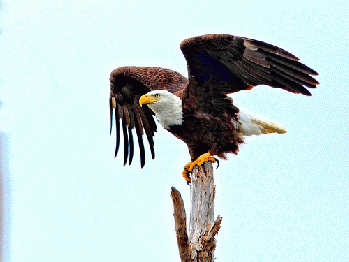Reprinted from www.psychologytoday.com
Even though I've been treating my native-made animal necklace with great care, the central turquoise figure, the eagle, has lost a wing. At the same time, I've been feeling highly anxious about the status of the planet and wildlife with all the bad news evidence coming out showing steep declines in every sign of ecological wellbeing j ust reported is the unexpectedly high temperatures of the oceans. I am taking the broken wing as a symbol of the increasing brokenness in the world.
Reading about how life used to be for most societies only a few centuries ago, like the Ohlone on the west coast of what is now California, deepens my sadness. Here are quotes from a new book, A People's History of Silicon Valley by Keith Spencer cited here :
"The Ohlone lived off acorns from all the different varieties of oaks, blackberries and gooseberries, chia, shellfish and the roots of many plants. They hunted squirrels, rabbits, elk, bear, whale, otter and seal. They did not "farm" in the western sense of the word, though they had a complex knowledge of how to use controlled burns to cultivate plant and animal food sources.
The Ohlone peoples had a very different relationship with animals than the Europeans. Predators like foxes, bobcats, mountain lions and coyote were plentiful, yet coexisted peacefully with the Ohlone. "Animals seem to have lost their fear and become familiar with man," said Frederick William Beechey, an English captain. It has been suggested that as the European colonizers openly hunted and killed easy game over several generations, animals adapted to the presence of gun-toting hunters and learned to keep their distance. "We take it entirely for granted that animals are naturally secretive and afraid of our presence," wrote historian Malcolm Margolin, "but for [the Ohlone] who lived here before us, that was simply not the case."
In the late 18th century, the newly-arrived Spanish quickly set up missions in California, and began forcibly taking Ohlone subjects into the missions ostensibly to convert them. Yet the Ohlone were held against their will and forced to labor for the Spanish, who separated men and women, lashing and hitting them when they refused to act as the missionaries pleased. One firsthand account describes the Spanish missions as indistinguishable from slave plantations."
What was wrong with those missionaries? Why did they bring a culture of slavery and death to a land of life and peace?
My work points to early experience (evolved nest ) and how it supports or undermines human capacities creating personalities that cooperate with nature or become oppositional to it (Narvaez, 2014). Harsh parenting-community environments undermine human potential and make individuals unwell in one way or another but also socially robotic and cruel instead of receptive and kind. Their brains don't grow their full capacities. Their self-regulatory systems don't get set up properly and so they are dysregulated in one way or another (e.g., physiologically, as in stress, immune, endocrine or other systems; emotionally with an inability to control negative, frustration emotions; behaviorally in terms of lacking skills for cooperation). Instead, they learned to shut down their own growth-their openness and receptivity-in order to survive in that environment. And they missed sensitive periods for developing flexible attunement skills for social life. As adults, undercared for and abused children not only are missing social skills, they have blinders on (unless they've had deep healing experiences). They are unable to perceive what is before them and instead are guided by a conditioned past, usually by ideologies or scripts that make them feel safe-a religion, a work ethic, a regimen.
Most Europeans who invaded and settled the Americas came from this kind of upbringing, wearing blinders when they arrived and imposing their own familiar scripts on the paradise that was this place (Merchant, 2003; Sale, 2006; Turner, 1994). Their scripts were ones of superiority-that their ways were best/most moral-demonstrating an inability to be multicultural and be open to diversity. They could not understand cultures unlike their own, assumed them to be savage and immoral, despite the fact that the native cultures raised democratic citizens who lived well and wisely, and sustainably with all the entities in the biocommunity, as the citations above (and many other historical accounts) indicate. The native peoples had more freedom as individuals, better diets, and greater happiness. And so Europeans would often run away to live with them, but not vice versa (Turner, 1994).
But the European invaders and settlers could not perceive the paradise that were the Americas. River otters were so plentiful they made it hard to canoe down the river; birds were so plentiful you could pick one from the sky. No, the Europeans could not appreciate what they found. From the start they brought not only their narrow cultural scripts but their own animals and their own plants, wiping out the local biodiversity (Scott, 2017; Turner, 1994).
We are still living with ghost theories of European roots. Psychological theory and research is too (Kidner, 2001). The British empire planted these theories all over the world and they still haunt our everyday life, forming the culture of destruction that has been forced on the planet. Here is a sampling with key principles in parentheses:
- European-rooted ways of being and viewing the world are better (white supremacy)
- Good people stand on their own two feet and make their own decisions (individualism)
- People who are not literate are ignorant (intellectualism)
- Human welfare should be put above the welfare of all others; if you don't control nature, it will control you (anthropocentrism; anti-ecology)
- Economic wealth should be a first priority (capitalism)
- The non-wealthy should work hard for economic wealth even though the wealthy don't have to (hierarchicalism)
- Only those who work should eat (coercion)
- Admire the economically wealthy no matter how they got there (capitalistic hierarchicalism)
How is a first nations worldview different? These principles are longstanding, only recently undermined in human history .
- Every landscape has brought about a different human culture but many basic values are the same (among first nation/indigenous peoples)
- Group living and group decision making are best and done in respect of mother earth's laws
- Nature literacy is vital
- Humans are the younger sibling of most other lifeforms and have much to learn from them; respecting the lives of all others is primary.
- Ecological and social wealth are priorities
- Enjoy life, respecting all its forms
- Share: There is enough for all
- Admire the person who honors "all their relations" (including the more than human) with careful living that preserves their wellbeing
These two worldviews come from a very different psychology, a very different childhood. These worldviews continue to clash. We can only hope that the old ways, the first-nation ways, will win out to restore balance to the planet.
REFERENCES
Kidner, D. W. (2001). Nature and psyche: Radical environmentalism and the politics of subjectivity. Albany: State University of New York.
(Note: You can view every article as one long page if you sign up as an Advocate Member, or higher).






